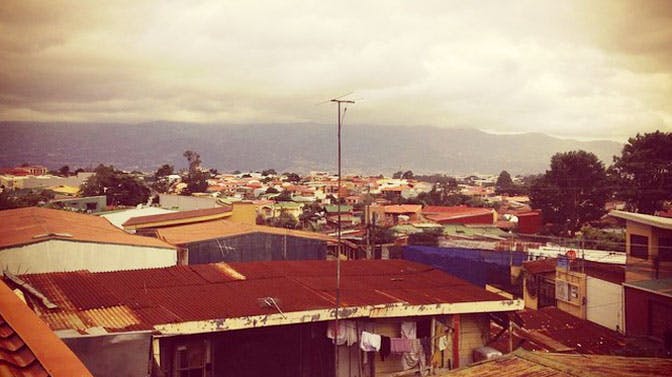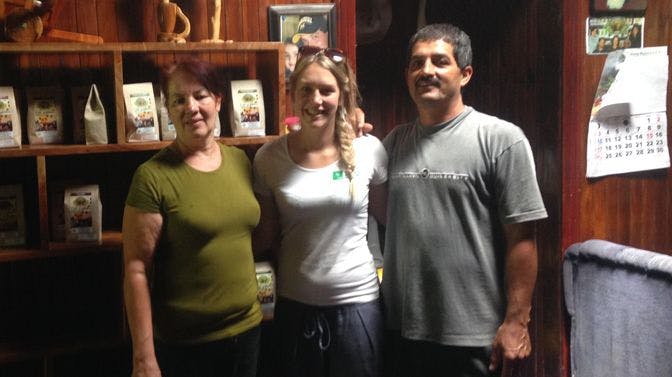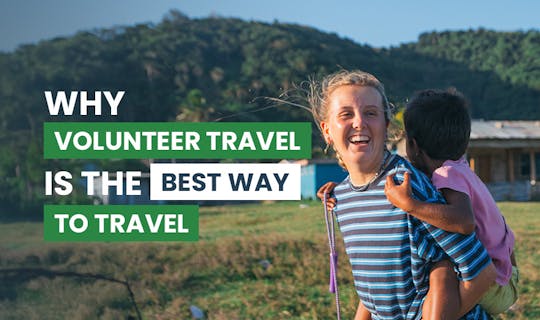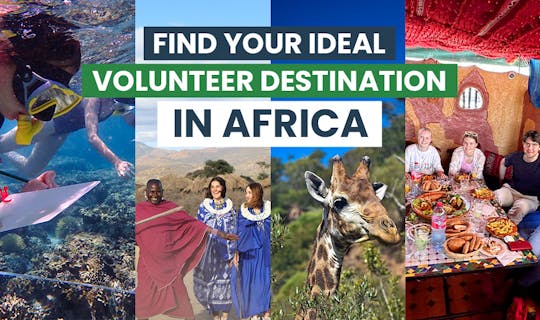Hola! As part of IVHQ’s regular program visits, I traveled to our volunteer program in Costa Rica to check in with our local team, meet with our volunteers, and visit our volunteer placements. For those looking into or thinking about volunteering abroad in Costa Rica, I hope this helps – have fun, Hannah x
Touch down in San Jose!
I arrived to San Jose airport very early and promptly found the local team waiting for me with a huge yellow flag. There was little to no traffic on leaving the airport and it took around 30 minutes to arrive at the local offices.
On first impressions, San Jose is yet another great big city with busy traffic and streets full of people, however after spending only a couple of days here, it is easy to understand why Costa Rica has previously been called the ‘happiest country on earth’. Locals are laid back and friendly, and their schedules run on Costa Rican time with the locals shouting ‘Pura Vida’ (no worries/pure life) as you pass by.
San Jose is bustling and hot with afternoon showers very common. Prices for transport and food are very reasonable and you can easily get by on 20,000 Colones per week (around US$40). You will need a little extra should you decide to travel on the weekends, as the beaches, volcanoes and forests are a half-day bus ride away. The offices of our local team have great Wi-Fi access and plenty of activities for your free time. They’re located around 15 minutes by bus from downtown San Jose, however they’re centrally located to everything you may need during your stay – banks, a pharmacy, a supermarket, food stores, bus stops, local bars and a mall (5 minute walk).
First-up, Eco-Agriculture Conservation
My first weekend in Costa Rica was spent visiting the Eco-Agriculture Conservation project in Monteverde (a 4 hour bus ride from San Jose). Our local team will arrange for you to be dropped at the bus station and collected by taxi when you arrive in Monteverde. What a beautiful place, if you are a bit of an adventure junky, can handle physical labour and have a passion for organic food and plenty of coffee, then this is the place for you to volunteer!
In only half a day, I learnt all the processes that go into picking, drying, shelling, cleaning and roasting the organic coffee beans, as well as the care and maintenance of the trees and seedlings. A wee tip for IVHQ volunteers who are going to this project - bring gumboots, a torch, gloves and a passion for great coffee.
Your free time while on this project can be spent flying through the cloud forest on Latin America’s longest zip line, bungee jumping, or taking a walk around the lakes and volcanoes. Of course if you are just looking to relax, there are also options for massages, drinking local craft beer, enjoying the markets, or horse riding.
The accommodation is basic but comfortable and the food and coffee are outstanding. Mama Ersi cooks plentiful amounts of food, using only ingredients off the farm, and Oldemar is passionate about the coffee and has refined the best practice to get a wonderful taste.
Over to Orientation
Upon returning from Monteverde, I joined the comprehensive volunteer orientation (always held at 8am on Monday morning) and was introduced to the volunteers who had arrived over the weekend. During orientation, volunteers are given information about San Jose and the local team, as well as details about the culture and safety precautions. This is followed by a short Spanish test to determine your language level before concluding with a tour of the building and local area.
The staff offices quickly became a central hub for volunteers to eat lunch, socialize with other volunteers, drink the free coffee and use the free Wi-Fi. Of course the staff are always available if you have any questions too. In the evenings, volunteers return for activities, such as free salsa or cooking lessons!
Checking in with our Childcare and Teaching Volunteers
My first placement visits in San Jose were to the Childcare placements, each one unique and very special. The ages of the children range from infants to 12 years old and children from the local community (who lack parental guidance or suffer from negligence) come to get an education, some love and attention, as well as food. These placements are very special and volunteers’ days spent with the children include arts and crafts, singing, playing sports, as well as teaching colors and manners.
Following this, I visited the Teaching English placements whose purposes occasionally serve as after-school style programs, teaching younger children, or alternatively as places for parents to come and learn English with their children. Teaching volunteers in Costa Rica are not restricted to just teaching English and if you see a need to teach something new, such as healthcare or a new sport, the field managers are open to your ideas and happy to help you implement these wherever possible.
Prior to starting any Teaching placement, volunteers are required to take an TEFL (Teaching English as a Foreign Language) crash course in San Jose to gain an understanding of how to structure a lesson plan, as well as implementing a second language (you can even plan ahead and up-skill with an online IVHQ TEFL course before you depart). If you are a little nervous about standing up in front of a class, don’t worry as the teaching is often in small tutorial style groups and can be less formal.
As an additional support to volunteer projects and for those who desire a more physical and hands-on project, you should consider a Construction and Renovation project. This type of project includes a range of activities, such as building the Childcare placements some new cubby holes for the children to store their belongings, to fixing roofs, or maintenance on the churches that house many of the placements. There is always plenty of work to maintain and the work is always different. Come prepared to be handy and work as part of a team with the local foreman.
Your Home away from Home
In between placement visits, I also had the chance to meet with the local families who have accommodated our volunteers for many years. Each host family was unique in their own way and provided support, guidance but also privacy when it was required. Staying with a host family is a great way to gain total immersion in the local culture and your time spent with this family is what you make it.
Breakfast and dinner is served on schedule, however the host families are always happy to save a meal for you if you are arriving home late. Each home stay accommodates anywhere from 2 to 15 volunteers at one time, and it is unlikely that you would ever be alone, most families also have younger children who are well-spoken in English. Volunteers also have the option of a private room upgrade, should they choose to have their own space.
Volunteer Opportunities in Special Education
Special Education placements are also an option for volunteers who are interested in helping students with learning difficulties and supporting local teachers in teaching both mentally and physically disabled children. Placements vary from schools for students with autism, to those who are blind or deaf, as well as a range of other mental and physical disabilities. Placements provide a healthy learning space for students, as well as facilities to support agility and exercise. Volunteers on these placements must have a knowledge of working in Special Education and have a calm and supportive nature.
Medical Volunteering Abroad
Many medical students join our Costa Rica volunteer program as it offers a great range of options for volunteers from pre-med up to fully qualified doctors and nurses. However, it is important to note that as you are participating in direct patient care, your involvement may be limited by the your level of your Spanish language skills. The more time you spend on the project and the more the nursing staff get to know you and see your abilities (including Spanish), the more work you are able to assist with. Work for Medical volunteers include elderly care (medical check-ups, physiotherapy and nutrition), to working with HIV/AIDS patients, to EMTs.
If you are limited in Spanish, not to worry, our local team in Costa Rica offer a Spanish immersion program which is offered at a discounted rate to IVHQ volunteers. Even if your stay on the program isn’t long, these classes are very beneficial and can be taught at the level you need them.
To the Turtle Project
My last two days in Costa Rica were spent on the Turtle Conservation project; we traveled again via bus (2 busses) for 7 hours to the remote location of Junquiall to participate on the turtle night watch.
Turtle Conservation volunteers will typically take orientation on Monday in San Jose with the rest of the group and then depart early Tuesday for their placements. As there is a fair distance to travel to these placements, volunteers will need to commit to a minimum of 2 weeks on the project.
This particular placement is quite isolated and suited to a volunteer who wants a laid back beach-based volunteer program. The nearest town is Santa Cruz, which is around a 45 minute bus ride from the volunteer base.
There is plenty of work to be done and volunteers have the pleasure of working alongside Gabrielle, a passionate biologist who has dedicated his everything to the protection of this beach, the community and the turtles who very often pay a visit to lay their eggs.
Volunteers who wish to assist in releasing baby turtles back to the ocean are likely to have the opportunity to do so on the Junquiall project, as they have a hatchery on site. This project is very community-based and volunteers can also spend their time taking care of the environment and the surrounding beach, replanting trees, teaching the local community and taking night patrol to watch out for any turtles that take to the beach to lay eggs.
If joining the IVHQ Turtle Conservation project, ensure you have plenty of insect repellent, sunscreen and light clothing, as it can get quite hot. For the night watch patrol, you will need to bring a torch with a red light on it or at least some red cellophane to put of the top of your torch.
I have thoroughly enjoyed my time visiting our volunteer program in Costa Rica and trust you will do the same, if you have any questions at all please contact the team at IVHQ, we would love to help plan a volunteer program that suits you, or visit the Volunteer in Costa Rica page for more information.
 Post by:
Post by: 







